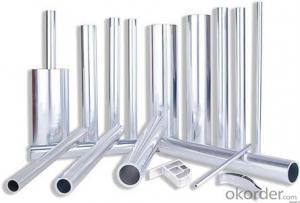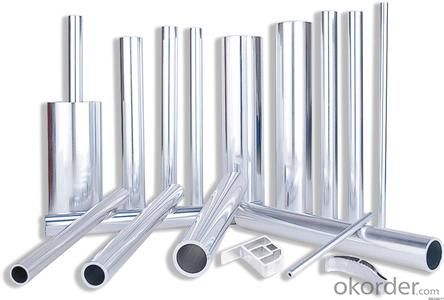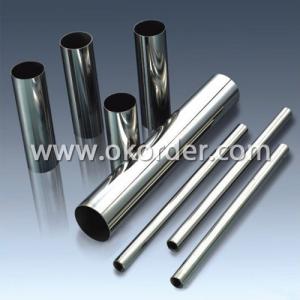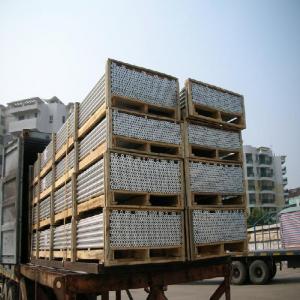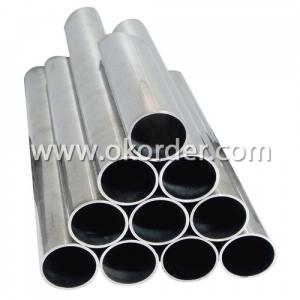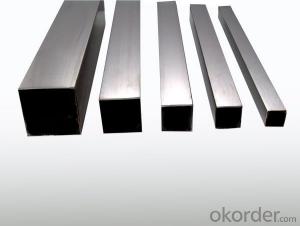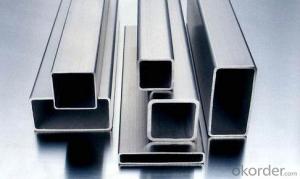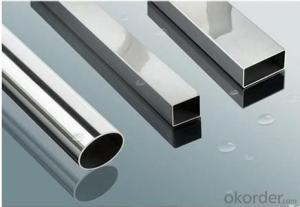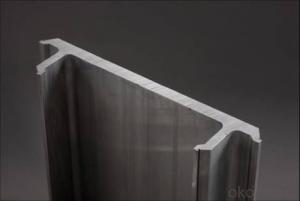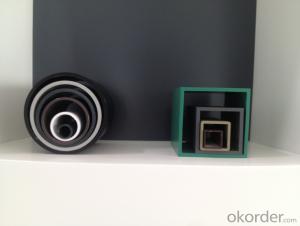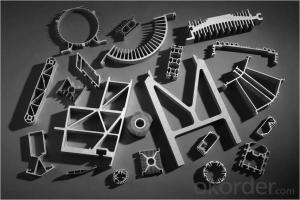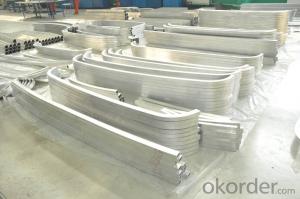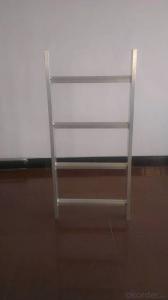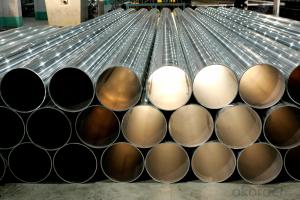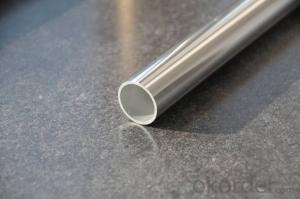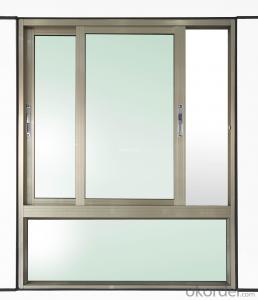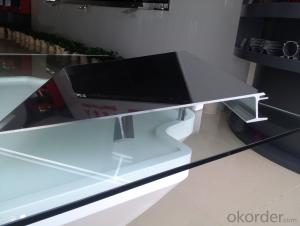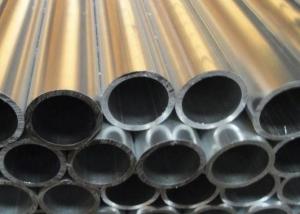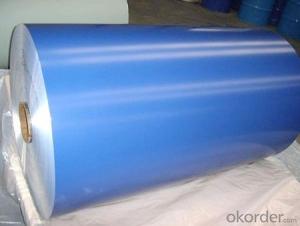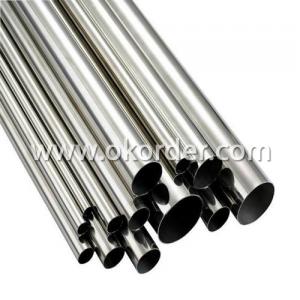Aluminum Pipes and Tubes
OKorder Service Pledge
OKorder Financial Service
You Might Also Like
We are the largest aluminum profilemanufacture in
Provide full size of seamed tubes(Round):
Diameter(Out):7.54mm-573mm
Wall thickness:1mm-44mm
Material | Alloy Aluminum 6063,6061,6005,6082 or customer nominated |
Temper | T3, T4, T5, T6 and other |
Surface | Anodize, electrophoresis, powder coating, PVDF coating, wood grain painting, etc. |
Colour | Any colour based on Standard Germany RAL Mark |
Length | Not more than 16 meters |
Good Package | Inner plastic film /outside carton/wooden pallets |
Payment Method | T/T, L/C, etc |
Delivery Time | Normally 2-4 weeks, Delivery time can be consulted. |
Press Machine | 500-12500 tons all together 93 press lines. |
Fabrication | 1. Furniture 2. Drilling; 3. Bending; 4. Cutting; 5. etc. |
Certificate | ISO/TS 16949,DNV,IRIS,CCS,AFA,etc. |
Dies | 1. Using our dies, no fee; |
2. Using customer drawing, opening dies, usually about 5~50 tons then the dies cost can be refunded. | |
3. Die cost is negotiable base on the order quantity | |
Capability | Annual output 800,000 tons |
- Q: The same size or different specifications of the square aluminum tube, T how to connect more beautiful ah?!
- Aluminum tubes are mainly divided into the followingAccording to the shape of: square tube, round tube, pattern tube, special-shaped tubeIt can be divided into seamless aluminum tube and common extrusion pipe according to extrusion method
- Q: Titanium tube pressure or aluminum tube withstand voltage?
- It depends on how to compare, pure titanium tube or titanium alloy tube? Pure aluminum tube or aluminium alloy tube? Titanium alloys and aluminium alloys are divided into many grades.
- Q: Which brands of refrigerator tubes are aluminium tubes and which ones are copper tubes?Ronshen, Meiling, Midea, Hisense, Haier, Hualing and so on, there are some other.
- Hello! At present, the refrigeration pipes in the refrigerator are made up of copper tubes, aluminum tubes and Bondi tubes, which can completely meet the normal use requirements of refrigerators.
- Q: Can aluminum pipes be used for irrigation pivot systems?
- Yes, aluminum pipes can be used for irrigation pivot systems. Aluminum pipes are lightweight, durable, and resistant to corrosion, making them an excellent choice for irrigation systems that require flexibility and longevity. Additionally, aluminum pipes have good heat conductivity, which can help maintain optimal temperature for irrigation water.
- Q: Is the cold storage iron tube good or the aluminum tube good?
- The advantages of multi row steel aluminum parallelism of aluminum heat exchange faster than steel refrigeration so faster and almost cost steel row because aluminum does not rust so late without steel row do antirusting maintenance
- Q: How do you weld aluminum plate and aluminium tube?
- Before determining and selecting the welding process for aluminium tubes and aluminium sheets, the following matters shall be determined:1. aluminum tube and aluminum plate metal material grade, according to your aluminum tube and aluminum plate material performance, joint use conditions and corrosion resistance, choose welding materials;2. aluminum tube and aluminum sheet metal properties;3. mechanical properties or strength, tensile strength and shear strength required for welded joints;4. welding joint working conditions, such as corrosion resistance.According to the above characteristics, choose the welding method for aluminum pipe and aluminum plate. At present, the main methods of welding aluminium tube and aluminium plate are:1. high frequency induction brazing: high frequency induction heating is used to melt the solder. The cost is low, and the use is convenient. At present, this process is used in many industries to braze the aluminum tube and aluminum plate;2. diffusion welding: generally used rarely, mainly for surface bonding;3. flame brazing: lower cost.
- Q: Are aluminum pipes resistant to saltwater corrosion?
- Yes, aluminum pipes are generally resistant to saltwater corrosion. Aluminum is known for its excellent corrosion resistance, including resistance to saltwater. It forms a thin, transparent oxide layer on its surface when exposed to oxygen, which acts as a protective barrier against corrosion. This oxide layer helps to prevent the metal from reacting with saltwater, thus making aluminum pipes highly resistant to saltwater corrosion. However, it is important to note that prolonged exposure to saltwater can still lead to some degree of corrosion over time, but compared to other metals, aluminum is considered to be one of the most corrosion-resistant materials for saltwater applications.
- Q: Aluminium tube production and equipment. What are the production techniques and what equipment are needed? How much will it cost?.
- Sapa heat transfer (Shanghai) Co., Ltd. pipe division any electrical engineer, project and process engineer, technical director, proficient in German sholar welding pipe production line, welding of various high-frequency tubes (flat tube, rectangular tube, pipe) technology and equipment are very fine, well versed in the world's most advanced tubes (especially thin-walled aluminum tubes, wall thickness of 0.20-0.32mm) welding technology.
- Q: What are the different diameters available for aluminum pipes?
- The manufacturer and specific requirements can cause variation in the available diameters for aluminum pipes. Nonetheless, aluminum pipes typically span a range of diameters starting from as small as 0.25 inches (6.35 mm) and extending to larger sizes like 12 inches (304.8 mm) or even larger. The intended use of the aluminum pipes can also influence the specific diameter options available since various industries and applications may necessitate specific sizes. To ensure that your specific needs are met, it is advisable to consult the manufacturer or supplier and ascertain the precise range of diameters for aluminum pipes.
- Q: Who knows there is a high mountain reed 2plus short tube is what? Urgent!
- A short tube called first aid tent pole, or emergency fault rod, when you appear in the outdoor pole fracture, but also can not be repaired, you can use the emergency fault bar is set in place, so you can still set up the tent,
Send your message to us
Aluminum Pipes and Tubes
OKorder Service Pledge
OKorder Financial Service
Similar products
Hot products
Hot Searches
Related keywords
